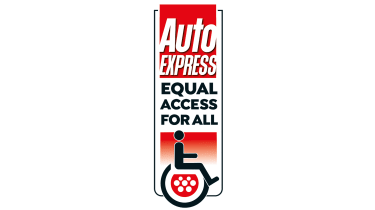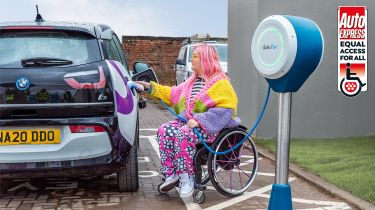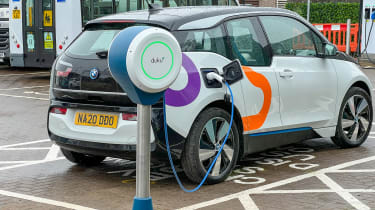New electric car charger answers call for accessibility
‘Barrier-free’ charger design offers hope for less-able drivers who want to switch to electric cars
Design agency Duku has revealed a world-leading, fully accessible public charger for electric cars, complete with a range of features intended to remove barriers for less-able drivers.
The new 7-22kW charger design has a patented fully assisted cable feed that is operated by buttons on the plug, so it can be deployed one-handed. A motorised drum delivers only the length of cable required, removing the effort of coiling and uncoiling.
There’s an accessible user interface designed to meet guidance on optimal graphics, information and colour use, and the charger features contactless payment so it doesn’t need a touchscreen, buttons or a mobile phone app to operate. The unit rotates 90 degrees so you can swivel it out of direct sunlight or point the cable towards your vehicle. The cable, and the unit itself, are coloured to improve visibility and reduce the hazard for partially sighted pedestrians.
Significantly, the design has no vulnerable cabinet that requires protection from parking scrapes or bumps. This means the charger can be fitted at road level, with no obstacles for wheelchair users, who can easily get close to the unit. The secret is a crash-resistant base with a self-righting post that protects the internal high-voltage cables.
The plastic shroud at the base of the post is designed to deform to absorb light impacts, or be quickly and inexpensively replaced following a heavier bump. Duku claims its ‘plug-and-play’ system means a unit can be replaced in 10 minutes using a pre-installed groundbox.
TV presenter, journalist and accessibility consultant Emily Yates, who drives and uses a wheelchair, participated in a recent trial of the charger in Dundee. “I find driving really liberating,” she said. “Unfortunately, due to the lack of accessible charging infrastructure in the current market, I am yet to own an electric vehicle. Having reviewed Duku’s new charger design that provides a completely barrier-free solution for my particular requirements, this may well change in the near future!”
Duku director Andrew Aylesbury told Auto Express: “Problems identified from initial research were predominantly the weight and difficulty of using cables, and obstructions around the base. A ‘tethered’ charger means the user does not need their own cable, and we then challenged ourselves to overcome the issue of moving the cable to the car and removing the need for bollards around the base.” He confirmed the unit is being developed for mass production, potentially as soon as 2024.
The new charger meets or exceeds draft guidance for a new voluntary BSI Group accessibility standard, which has just entered the public consultation phase and is due to be published later this year.
Consultancy Urban Foresight worked closely with Duku on the eight-month charger project, part-funded by Innovate UK, and project manager Clare Pennington said: “With the potential for hundreds, possibly thousands of chargepoints to be installed before the guidance is published, it’s really important for organisations to be proactive and consider what they can do now to ensure their chargepoints are accessible.”
Auto Express Equal Access For All campaign

Find a car with the experts






